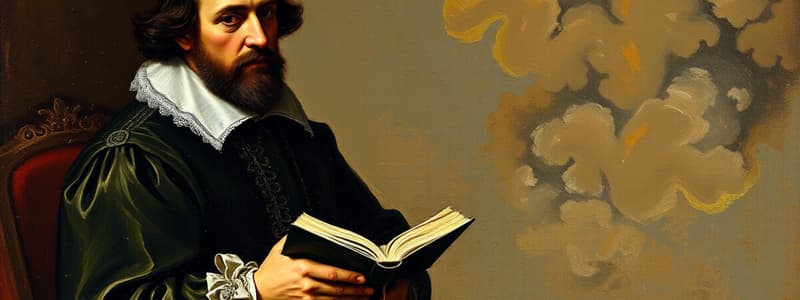Podcast
Questions and Answers
Summarize the events of Act 2, Scene 2 of Hamlet.
Summarize the events of Act 2, Scene 2 of Hamlet.
Claudius and Gertrude greet Hamlet's old friends Rosencrantz and Guildenstern and summon them to Elsinore to figure out why Hamlet is melancholy. Polonius enters claiming to have figured out Hamlet's madness. Meanwhile, the ambassadors return from Norway with news about Fortinbras. Claudius agrees to let Fortinbras' army pass through Denmark. Polonius proposes to stage a meeting between Hamlet and Ophelia to test his theory about Hamlet's lovesickness. Hamlet interacts with Rosencrantz and Guildenstern and mulls over his own feelings of despair, ultimately planning to use a play to reveal Claudius's guilt.
What does Claudius's speech to Rosencrantz and Guildenstern indicate?
What does Claudius's speech to Rosencrantz and Guildenstern indicate?
The Royal pronoun 'we' is used to describe Claudius's authority and religious legitimacy, suggesting control and allowing him to manipulate Rosencrantz and Guildenstern.
What does Gertrude's welcome suggest about the royal relationship to Rosencrantz and Guildenstern's visit?
What does Gertrude's welcome suggest about the royal relationship to Rosencrantz and Guildenstern's visit?
'Expend your time with us...for the supply and profit of our hope.' This suggests the objective nature of Rosencrantz and Guildenstern and their manipulation by the Royals.
How is the interplay between Claudius and Gertrude significant?
How is the interplay between Claudius and Gertrude significant?
What is the role of Rosencrantz and Guildenstern generally?
What is the role of Rosencrantz and Guildenstern generally?
What could the tale of Fortinbras indicate about Hamlet and Claudius?
What could the tale of Fortinbras indicate about Hamlet and Claudius?
Flashcards are hidden until you start studying
Study Notes
Scene Summary
- Claudius and Gertrude summon Rosencrantz and Guildenstern to discover the cause of Hamlet's melancholy.
- Polonius believes he knows the reason for Hamlet's madness but is interrupted by the return of ambassadors from Norway.
- The ambassadors report Norway's approval of Fortinbras's planned attack on Poland, and Claudius decides to grant passage to Fortinbras's army.
- Polonius reads Hamlet's love letters to Ophelia, suggesting lovesickness as a possible cause of Hamlet's behavior.
- Polonius proposes to stage a meeting between Hamlet and Ophelia to confirm his theory; Claudius agrees.
- Hamlet exhibits bewildering behavior during his conversation with Polonius, hinting at deeper meanings related to Denmark and his family.
- Hamlet reveals his discontent and views Denmark as a prison, emphasizing the subjective nature of reality.
- Upon learning of the arrival of a players' troupe, Hamlet expresses relief and intent to use their performance to expose Claudius's guilt in his father’s murder.
- Hamlet plans to insert specific lines into the play to evoke a reaction from Claudius.
Claudius's Authority
- The use of the Royal pronoun "we" reflects Claudius's authority and attempts to legitimize his rule.
- The pronoun signifies control and suggests manipulation of Rosencrantz and Guildenstern.
Gertrude's Interaction
- Gertrude’s phrase "expend your time with us" employs commercial imagery, portraying Rosencrantz and Guildenstern as tools for the Royals' benefit.
- This implies the Royals' objective approach towards their guests, manipulating their presence for personal gain.
Claudius and Gertrude's Relationship
- Their differing forms of thanks display a subtle internal conflict in their relationship.
- This dialogue serves to create a distance between Gertrude and Claudius while highlighting their individual characters.
Role of Rosencrantz and Guildenstern
- Represent the theme of manipulation; they serve as pawns in the scheme of the Royal court.
- Hamlet's constant rebukes showcase his strong character in contrast to their submissive roles.
- Highlights the theme of appearance versus reality in their interactions.
Fortinbras's Significance
- Fortinbras's actions may reflect Shakespeare's acknowledgment of Hamlet's introspection and pursuit of truth.
- Fortinbras's ability to act contrasts starkly with Hamlet's indecision, indicating that excessive contemplation leads to failure.
- Fortinbras’s military ambitions against Poland may symbolize qualities of effective rulership, juxtaposed with Hamlet's procrastination.
Studying That Suits You
Use AI to generate personalized quizzes and flashcards to suit your learning preferences.




